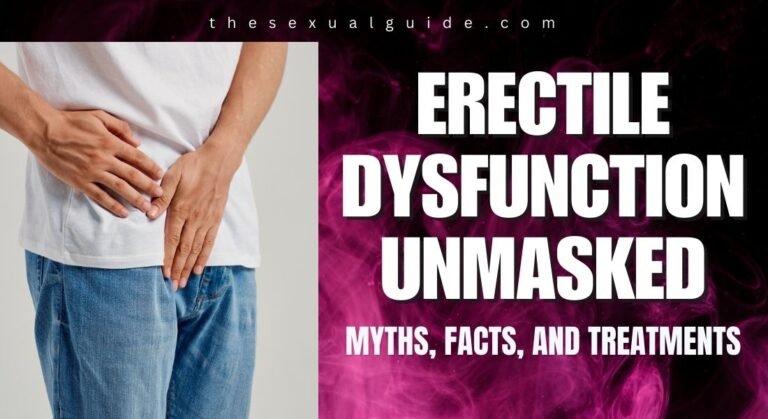In recent years, the ‘NoFap’ movement has garnered attention as a method for enhancing mental clarity, increasing energy, and improving sexual performance.
For those unfamiliar, ‘NoFap’ refers to the practice of abstaining from pornography and masturbation, often for a extended period of time.
Proponents claim that this abstinence leads to a wide range of benefits, from better focus to improved relationships.
However, there is an ongoing debate about whether quitting entirely truly results in enhanced sexual performance or if it may even have unintended consequences.
In this post, we’ll explore the claims of the NoFap movement, its impact on sexual health, and how it relates to erectile dysfunction (ED) and libido.
We’ll also dive into the science of dopamine, libido, and sexual performance, with expert opinions and scientific insights to shed light on whether this abstinence trend truly works.
What is the NoFap Movement?
The NoFap movement originated from online communities and has gained significant popularity, particularly in the realm of self-improvement and health.
The name “NoFap” comes from the slang term “fap,” which refers to masturbation.
The movement promotes abstaining from both pornography and masturbation for extended periods, with some participants even claiming to go without sexual release for months.
What Do NoFap Advocates Claim?
Followers of NoFap suggest that abstaining from these activities leads to various benefits, including:
- Increased energy levels: Without frequent sexual release, participants report feeling more energized.
- Enhanced focus and productivity: Some claim that their mental clarity and work performance improve.
- Improved relationships: Abstinence is said to help people reconnect with their partners and reduce unhealthy sexual habits.
- Boosted self-esteem: By gaining control over their sexual desires, many NoFap proponents believe they experience heightened confidence and self-control.
However, while these benefits are widely shared within the community, the scientific evidence supporting them is often anecdotal or lacks rigorous study.
The Science Behind NoFap: Dopamine, Libido, and Sexual Health
To understand whether NoFap’s claims hold any water, it’s important to go into the scientific mechanisms at play, particularly regarding dopamine and libido.
Dopamine: The Brain’s Reward System
Dopamine plays a central role in motivation, pleasure, and reward. It’s released during pleasurable activities like eating, exercising, and yes, sexual activity.
When a person engages in sexual activity or watches pornography, dopamine levels surge, providing a feeling of satisfaction.
Over time, the brain can become accustomed to this high, leading some to experience dopamine desensitization.
The theory behind NoFap is that abstaining from pornography and masturbation allows the brain to reset its reward system.
As dopamine levels stabilize, proponents claim that people can regain sensitivity to normal stimuli, resulting in greater pleasure from everyday activities, not just sexual ones.
Libido and Sexual Performance
One of the key arguments in favor of NoFap is that abstaining can improve libido and sexual performance, particularly in men.
The theory is that without the constant cycle of overstimulation from pornography, the brain and body can return to a more natural state of sexual desire.
However, studies examining this theory have yielded mixed results.
While some research suggests that excessive pornography consumption can reduce libido and lead to performance issues like erectile dysfunction (ED), other studies point out that moderate masturbation is not necessarily harmful to sexual health.
In fact, masturbation is a natural part of human sexuality and may even have positive effects, such as improving pelvic floor strength and reducing stress.
Does Quitting Pornography and Masturbation Improve Sexual Performance?
The short answer? It depends.
Potential Benefits
For some individuals, abstinence from pornography and masturbation may provide a reset for their sexual health.
By reducing exposure to the overstimulation caused by excessive porn use, individuals may find that their libido improves over time.
Additionally, reducing distractions from constant sexual imagery can lead to more meaningful and connected sexual experiences with a partner.
For some men, abstinence has been linked to better erections and higher testosterone levels, which can have a positive effect on sexual performance.
The Risks of Complete Abstinence
On the flip side, complete abstinence may not be as universally beneficial as many claim. There are several potential drawbacks of quitting entirely, especially when taken to the extreme:
- Increased anxiety: For some men, the pressure to “perform” after extended periods of abstinence can lead to performance anxiety and stress.
- Unrealistic expectations: NoFap can inadvertently lead to heightened sexual expectations. This can set up men for disappointment, especially if they haven’t had the chance to gradually reintroduce sexual activity.
- Imbalance in sexual health: In some cases, completely quitting can disrupt natural sexual rhythms, potentially leading to sexual frustration and negative emotional consequences.
Erectile Dysfunction (ED) and NoFap
Erectile dysfunction (ED) is a condition where men struggle to achieve or maintain an erection during sexual activity.
ED can be influenced by numerous factors, including stress, anxiety, underlying health conditions, or the overstimulation caused by pornography.
The NoFap movement suggests that quitting pornography and masturbation can help eliminate one potential cause of ED, giving individuals the chance to recover and improve sexual function.
However, the evidence linking NoFap directly to improved erectile function is limited, and medical experts caution that ED is a complex condition that requires a holistic approach.
Psychological factors, such as anxiety, depression, and relationship issues, are often significant contributors to ED.
Moreover, lifestyle changes, such as improving diet, exercising, and managing stress, can often provide more substantial improvements to erectile function than simply abstaining from sexual activity.
The LibidoDepot Approach to Sexual Health
While NoFap has its proponents, it may not be the best approach for everyone, especially those who are experiencing persistent sexual performance issues.
LibidoDepot offers a range of trusted solutions for individuals dealing with ED, including effective treatments to address underlying causes and enhance libido.
If you’re struggling with erectile dysfunction or have concerns about your sexual health, it’s important to consult a healthcare professional and explore a variety of treatments.
You don’t have to rely on extreme measures to improve your sexual performance.
What Does the Research Say About ED and Libido?
The National Institutes of Health (NIH) notes that ED is commonly linked to physical and psychological factors, ranging from cardiovascular disease to stress.
A study published in the Journal of Sexual Medicine revealed that factors such as age, lifestyle, and health conditions (e.g., diabetes) play a much larger role in erectile dysfunction than previously assumed.
While NoFap might work for some individuals by removing pornography from their lives, it’s not a one-size-fits-all solution for erectile dysfunction.
Instead, a comprehensive treatment approach that considers all contributing factors is essential.
Conclusion: Does NoFap Really Boost Your Performance?
The answer isn’t clear-cut. While NoFap may provide benefits for some individuals, especially those seeking to reset their reward system, it isn’t a guaranteed fix for everyone.
In fact, extreme abstinence can lead to unintended negative effects, including increased anxiety and sexual frustration.
Ultimately, if you’re dealing with issues like erectile dysfunction, it’s important to approach the situation holistically.
In some cases, trying approaches like NoFap may be beneficial, but other treatments or lifestyle changes might offer more lasting improvements.
Want to learn more? Visit LibidoDepot for trusted solutions and professional guidance to boost your sexual health and performance.
Frequently Asked Questions (FAQs) – The Truth Behind "NoFap": Performance Boost or Overhyped Hype?
1. What is the NoFap movement, and why do people believe it boosts performance?
"NoFap" is a community-driven movement encouraging people mainly men to abstain from masturbation and porn, often with the goal of improving energy, focus, sexual performance, and confidence. Many followers claim benefits like sharper mental clarity, increased motivation, and better sexual control.
2. Is there scientific evidence that quitting masturbation improves sexual performance?
The science is mixed. Short-term abstinence (around 2–3 days) can temporarily raise testosterone levels and increase arousal sensitivity. However, there’s no strong evidence that long-term abstinence leads to lasting performance gains. In fact, regular, healthy masturbation is often linked to improved sexual awareness and function.
3. What are the potential downsides or risks of extreme NoFap adherence?
Some followers may develop guilt, anxiety, or obsession around natural sexual urges, especially when framed as “bad” or “weak.” For some, "NoFap" can morph into a form of sexual shame or compulsive self-monitoring, which may hurt mental health or relationships more than help.
4. So, is "NoFap" helpful or harmful for most people?
It depends on the intent and mindset. If someone uses it to break a compulsive porn habit or regain control over impulsive behaviors, it can be empowering. But if it leads to shame, unrealistic expectations, or black-and-white thinking about sex, it may do more harm than good. Balance and self-awareness are key.
References
- Study Shows The Downsides To "No Fap" And "Reboot" On Your Health
- Masturbation abstinence is popular online. Doctors and therapists are worried
- NoFap toxicity: anti-masturbation online communities linked to depression, anxiety, and even suicide
- NoFap Benefits: Real or Overhyped?
- This new sexual health trend has your patients seeking unverified health benefits






